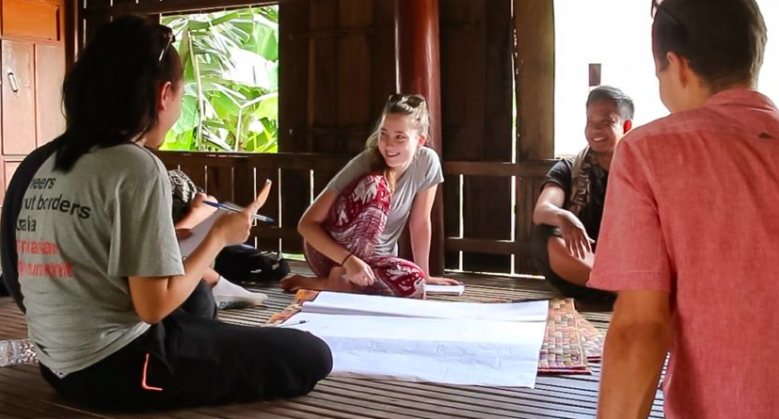Young Australians eager to join harmful ‘voluntourism’ programs in SE Asia
Mojo Correspondent made several attempts to contact a spokesperson from STA Travel, regarding the promotion of volunteering with children on their website, and to clarify STA programs that advertise encounters with “underprivileged Cambodian...
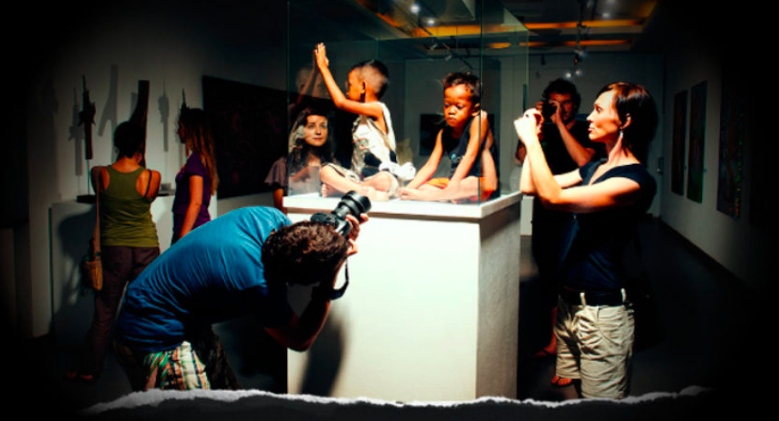
By Tess Ikonomou
Young, hopeful, and well meaning Australians are flocking overseas to volunteer in Cambodian orphanages, often unaware of the damaging impact they are having on the country.
Universities across Australia are also indirectly contributing to the harmful practice by hosting organisations that promote questionable tourism activities.
‘Voluntourism’ is the phrase given to describe the rise of mainly western tourists paying organisations, including orphanages, to volunteer with them and spend time with children placed in these institutions.
The number of orphanages in Cambodia has soared, with suppliers eagerly trying to match the demand for cute and available children to play with.
According to Friends International spokesperson James Sutherland, surveys conducted by UNICEF and the Cambodian Ministry of Social Affairs, found within the country’s central tourist areas 297 orphanages were in operation.
“Phnom Penh, Siem Reap, Battambang, those are the core areas,” he said.
They also estimate the number of children residing in orphanages reaches 12,000 in five of Cambodia’s provinces, excluding the rest of the country.
ANU University student Brock Holland volunteered at one of these orphanages, and said he only realised the extent of the emotional toll felt by the children when he left.
“One of the younger girls came to me, I remember I was about to get on the tuk-tuk, I never heard her say much in English other than “hello,” “goodbye” and she said, ‘I don’t want you to leave’.
“It was a very upsetting moment, the saddest thing wasn’t that I was going to leave, it’s that those kind of moments happen every day.
“You get really close to some of the kids you teach but having you leave suddenly out of their lives after just gaining their trust would be pretty devastating,” he said.
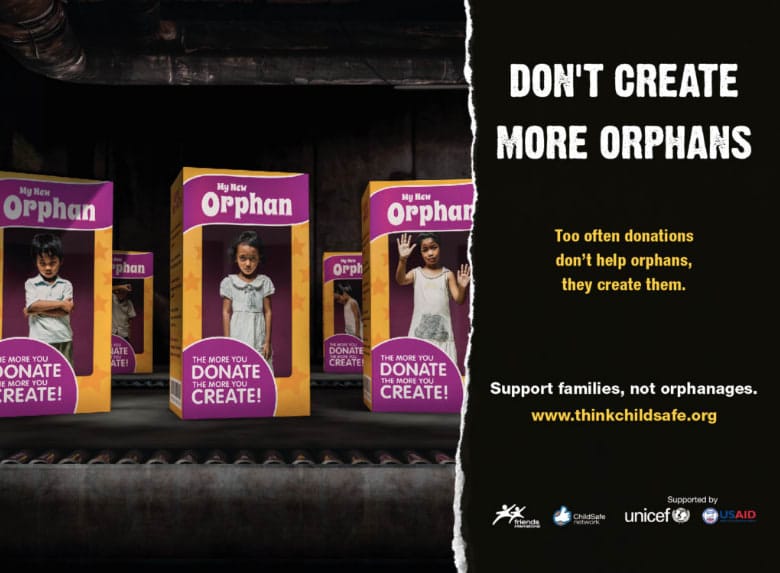
Mr Holland said the orphanage he was paying to stay at had a high turnover of groups as large as 40 coming through, with the founders structuring the children’s schedule to ensure their customers were satisfied.
“They would tweak the schedule of the kids to accommodate for an experience for the western people who stayed there,” he said.
Mostly unqualified and without teaching experience, the volunteers would hold classes for the children.
“The lessons were mainly run in the night…They were in my opinion rubbish, they were lessons that weren’t informed by any sort of curriculum. It was more or less come up with something and just run with it.
“I think a lot of them (volunteers) wanted to come over just for the experience,” Mr Holland said.
Mr Sutherland said western foreigners with good intentions could be extremely naive and needed to evaluate the situation with logic.
“One of the key things we say with all of our child safe campaigns is ‘think, think, think’. This is the problem. People are reacting often entirely emotionally.
“They don’t think about what action they’re taking or will it actually help.”
Friends International has been approached by foreigners who have been shocked to find a lack of transparency in the organisations they have been donating to.
“They came to us and said, we’ve been pumping hundreds of thousands of dollars into this orphanage and when we visited unexpectedly, they tell us they can’t provide us with receipts,” Mr Sutherland said.
Some children found in the orphanages are not orphans at all, and still have family alive to take care of them.
Mr Sutherland said poor families were being exploited and manipulated into giving their children up to these organisations.
“We’re seeing a situation where orphanages are seen as the best option. It’s like the orphanage has come and said we can offer this and that, families feel pressured into giving their children up.
“There have been a number of instances were people have thumb printed a document but cannot read, they have no idea what they’re doing when they sign their children over into care.”
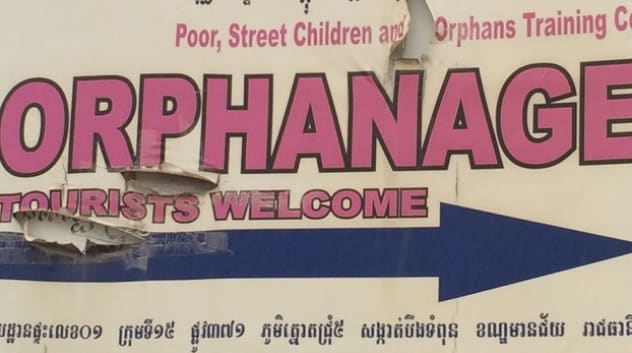
Going for the ‘experience’
These orphanages operating in Cambodia provide the perfect combination for young Australians wishing to travel the world and “help” marginalised and disadvantaged communities.
Monash University student Taylor Courter visited an orphanage that had been founded by a western Christian couple for children diagnosed with HIV.
“It’s mostly just spending time with the kids and helping out in classrooms…We sat in on classes, helped teachers and did some colouring in.”
Ms Courter said her trip was mainly about the “experience” rather than properly assisting the owners with the children’s needs.
“Most of it was socialising, playing with the kids, spending time with them.”
She didn’t notice the children becoming visibly upset when her group or temporary teachers were leaving the orphanage, and believes this is a coping mechanism that has been adopted.
“A lot of the teachers are coming and going. Having people coming and going every few weeks, none of them seemed too distressed but then again you would of have to have learn’t the hard way.
“We only did spend a week there, got to know some of the children but will never be seeing them again,” Ms Courter said.
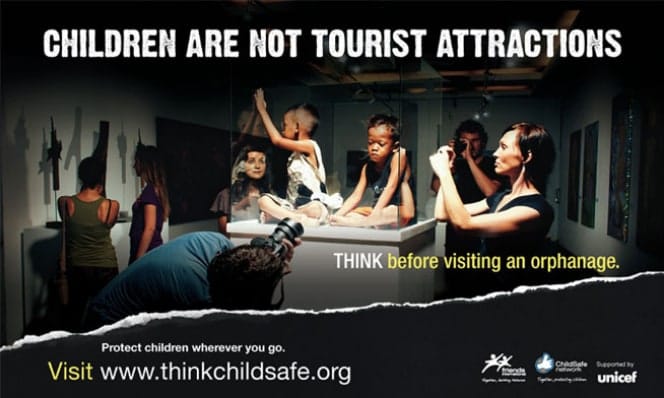
Universities supporting voluntourism
Australia’s universities are unwittingly enabling the practice of voluntourism to flourish on their campuses, by allowing some organisations to set up stands and hand out brochures.
Mr Sutherland said organisations are recruiting oblivious students from universities.
He is urging tertiary institutions to reconsider the programs being offered to students, as a result of the damaging impact on families and individuals.
“If you’re encouraging organisations to push products on your students, really think about the effect of that in the longer term.”
Universities allow various companies and organisations to promote their “teach English” volunteer trips in Southeast Asia during orientation weeks.
Another company, STA Travel, advertises volunteer programs on their website and has many stores located on university campuses.
Dr Karleen Gribble, an adjunct associate professor with Western Sydney University, has researched and written about the impacts of voluntourism.
She first became aware of STA Travel’s programs that include interacting and spending time with children in developing communities after her daughter brought home a brochure from her university in Newcastle.
“STA Travel was actually organising voluntourism trips to Cambodia, targeted towards university students.”
Dr Gribble said she tried to speak to STA Travel about discontinuing these programs because of the negative impact that can have.
“I did ring them and talk to them about it, but they didn’t seem very convinced,” she said.
Mojo Correspondent made several attempts to contact a spokesperson from STA Travel, regarding the promotion of volunteering with children on their website, and to clarify STA programs that advertise encounters with “underprivileged Cambodian children and orphans”.
They did not respond prior to publication.
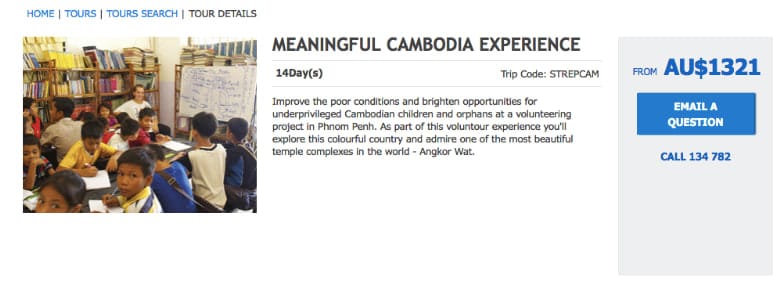
Detrimental effect on children
The implications of having numerous people entering and leaving the children’s lives are often overlooked by the foreigners who visit them.
Dr Gribble said having a revolving door of caregivers was not how “human beings work”.
“One of the most damaging aspects of institutional care is the large number of caregivers that they have…When we’re young we need to learn about relationships.
“Very young children can only have very meaningful, in-depth relationships with a limited number of people.
“They end up in a position where they have enormous difficulty with relationships, and also with the view of themselves, they learn that they can’t rely on adults, that they’re not loveable,” she said.
Without stable and reliable relationships, young children could potentially experience difficulty in learning to communicate through language.
“Children who are in families where their parents speak different languages can become bilingual very quickly and easily, it’s not a problem. But if you’re exposed to a different language every week, for fifty weeks, you will actually learn no language,” Dr Gribble said.
It isn’t just the mental or social growth that is affected by not having a small number of adults to take care of the children, rather it also impacts their physical well being.
“For children in orphanages the stress is so great, the stress of having so many caregivers and of not having their needs that it actually stunts their growth.
“The stress levels are so high that growth hormones are not released in normal amounts, so they often end up very short. It affects all areas of development,” she said.
Dr Gribble said foreigners were deceived by the displays put on show by the children in order to receive the attention they crave.
“The implications for the individual are vast. People actually go to these institutions and what they see is happy,laughing children.
“When adult attention is scarce, it’s a really good adaptation to make yourself cute and charming to get that scarce adult attention.”


